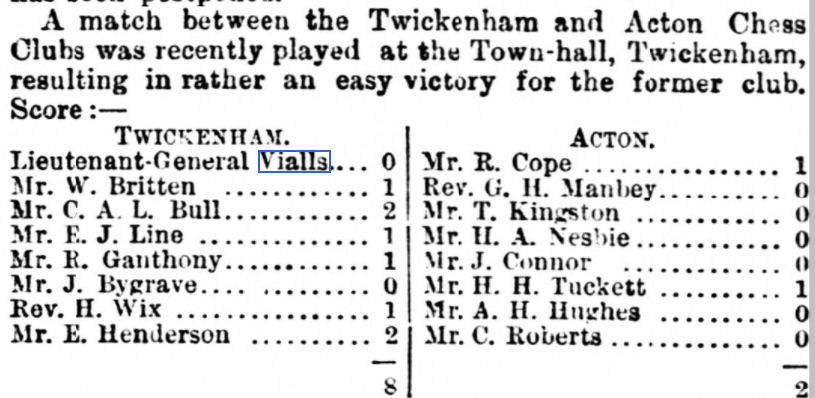
You’ve seen this match result before. On board 5 we have Mr R Ganthony, a man with an unusual surname. It should be possible to find out more about him.
Unlike the other players we’ve seen, he was from Richmond, not Twickenham or Teddington, but there were three Mr R Ganthonys (Ganthonies?) of chess playing age in the household: Robert Davy Ganthony and his sons Robert junior and Richard.
A match the previous month, also against Acton, where he drew his game on board 3, gave his middle initial: Mr R D Ganthony, so that tells us it was the father who played chess for Twickenham.
If you come across an unusual surname you can do a one-name study. I’ve done a study of the surname Badby, for example. This name was relatively common in the Middle Ages but all but one branch died out, so if you have this name in your family tree at some point over the past 200 or 300 years you’re related to me!
It turns out that Robert Davy had a famous father and grandfather, as well as three famous children. Famous in their day, that is, but all (apart perhaps from his father) forgotten today.
The family were originally from Exeter (the earliest record available online dates back to 1662), but our branch moved to Bristol at the end of the 17th century.
The first important Ganthony was Joseph, born in Bristol in 1739, the son of Joseph and Susannah, a musician, whose work brought him to London in about 1766. He played the violin and double bass, and also composed popular songs, which would have been performed in the pleasure gardens of the day, and church music. When Hector Berlioz visited London in 1851 (did he also take the opportunity to visit the first international chess tournament while he was there?) he was moved to tears on hearing one of his hymn tunes. He was also a schoolmaster at St Giles’s Cripplegate School in the City of London. No death record has been found for him, but school records mentioning his name go up to 1785. You can read more about him – and even play one of his hymn tunes if you have a keyboard to hand – in the October 1 1903 issue of The Musical Times here.
Joseph married Elizabeth Davy in Bristol in 1762: they seem to have had a large family, although several of their children died in infancy. Our interest is in Richard Pinfold Ganthony, born in London in 1771.
Richard chose a different career, achieving fame and fortune as a manufacturer of clocks and watches. his pieces are very collectible today.
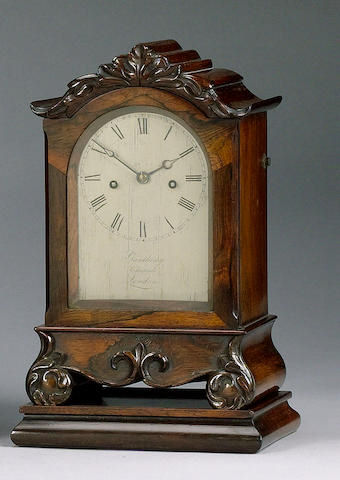
Here, for example, is a rosewood bracket clock, which sold for £2390 at Bonham’s in 2004. (Their information about the family, I believe, is incorrect: Richard Pinfold’s father was Joseph, not Richard, but it’s possible that Richard Pinfold’s son, another Richard, might have been apprenticed to him.)

This is a rare and beautiful clock barometer, made in about 1830. We’re told that Richard Pinfold Ganthony is listed in “Barometers Makers and Retailers 1660-1900 by Edwin Banfield: as a clock and chronometer maker at 63 Cheapside London between 1821 to 1845, he is considered as a good and important maker of his day…
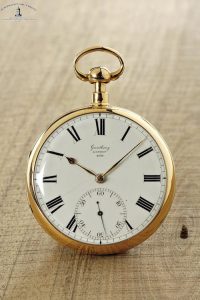
This gold framed pocket chronometer manufactured in about 1815 (the frame has an 1814 hallmark) is described as a ‘very interesting timepiece’. Again, the source gets the two Richards confused, but we learn that he was apprenticed to Thomas Miles until 1794 and became a master in 1828. It fetched €4000 at a recent auction. We also learn that he moved from Lombard Street to nearby Cheapside at some point between 1815 and 1821.
Richard Pinfold Ganthony married twice, and seems to have had four children from each marriage. One of the sons of his first marriage, Richard Junior, may well have been apprenticed to him. He died in London in 1845, but a death record for Richard Junior doesn’t seem to be available.
His second marriage produced twin sons, Charles and Robert Davy. Charles disappeared after the 1841 census, but we know quite a lot about our man Robert Davy Ganthony.
In 1847 he married Caroline Henrietta Harvey in Paddington, and children were born there in 1849, 1851 and 1852. But in the 1851 census Robert is nowhere to be found. Caroline is unexpectedly in Caernarfon, on the North Wales coast, with 2-year-old Robert junior and baby Edith, described as an ‘artist’s wife (landscapes)’. Well, I guess there were a lot of good landscapes to paint there, with Snowdonia on one side and views across the Irish Sea to Anglesey on the other.
Marian was born back in London in 1852, but by the time of Emily’s arrival in 1854 (sadly she died the following year) they’d moved to Liverpool. The Liverpool Mercury of 3rd February featured an announcement from Mrs Brooks, widow of the late Mr John Brooks, that his practice would be taken over by ‘Mr Ganthony, a gentleman with great experience in every department of dental surgery, from London’. He’s no longer drawing landscapes (at least not professionally), but drawing teeth instead. Perhaps he’d studied dentistry in the 1840s, but took a break to work as an artist. A second son, named Richard after his grandfather, was born there in 1856, followed by Charles Alfred in 1859 and Kate in 1861.
By 1863, he appears to have retired from dentistry and moved to Richmond, where Ada was born that year, followed by his youngest child, Harry, in 1866. In the 1871 census Robert, Caroline and their eight surviving children are all living in Eton Lodge, in the town centre, close to the parish church. Robert Davy Ganthony has reverted to being an artist. Caroline is once again an artist’s wife, Robert and Richard (only 14) are both involved in clerical work, no occupation is listed for the two older girls, while the younger children are all at school. Their two servants, Elizabeth Smith and Rebecca Bull, had both been with the family a long time. Rebecca was working for them twenty years earlier in Wales, and they were both in the household in Liverpool ten years earlier.
By 1881 not a lot had changed. Robert senior was still an artist, and still married to Caroline. Also at home were the four youngest children, along with Robert Junior, now an actor and author, and his wife. Their faithful servant Rebecca Bull was still there as well. It was this stage of his life that saw his brief career in competitive chess: from his position in the Twickenham team he must have been a reasonably proficient player, and must have played socially most of his life.
In 1891 he was still in Richmond, now an artist and sculptor, with his wife and four of his children: Marian, a schoolteacher, Charles, a clerk, Ada, an actress and Harry, a macramé mat maker. Rebecca Bull had by now retired to a nearby almshouse and had been replaced by a young servant.
Caroline died the following year, but Robert was still going strong. In 1901 he was living with his daughter Marian, his unmarried sister Maria, and, again, a teenage servant.
Robert Davy Ganthony kept active to the end of his life. He was always a keen cyclist, although it’s not entirely clear whether it was he or his oldest son who had been fined for riding a velocipede along a public footpath back in 1869.
And then, in 1905, this happened.
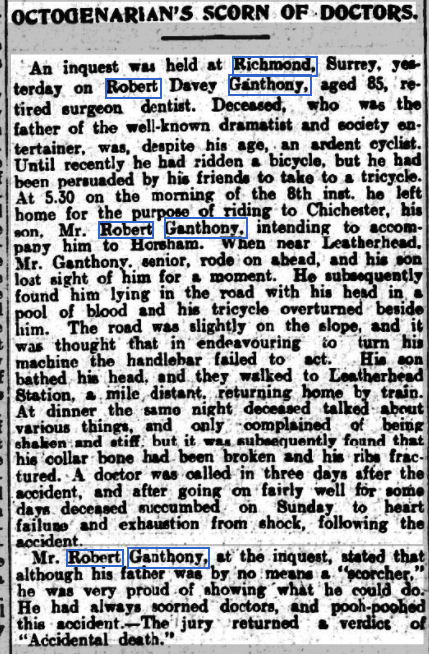
An extraordinary story: what a way to go, and what a man he must have been.
(It seems that the streets of England at that time were full of elderly gentlemen named Robert suffering tricycle accidents. In August 1899, round about the time of his 76th birthday, Robert Padbury was thrown from his tricycle in Cox Street, Coventry. Although he was still in a critical condition he was sent home from hospital a few days later. He died the following March: it’s not known whether or not the accident was responsible for his death. How do I know this? Robert was my great great grandfather, and his name was originally Badby.)
It’s worth a look at three of his children. We’ve seen that Robert junior was an actor, dramatist and society entertainer, and that his daughter Ada, whose stage name was Nellie Ganthony, was also an actress. They were both very popular performers in the days of Music Halls.
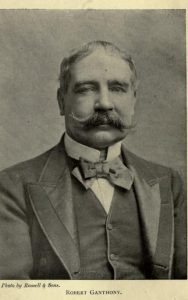
Robert was nothing if not versatile. He wrote and performed comic songs, sketches and monologues (The Man with the Single Hair) in the fashion of the times, wrote textbooks on ventriloquism and performed conjuring tricks.
You can find a pdf of his book Bunkum Entertainments, which gives you a flavour of his act and, more generally, with the type of entertainment popular in his day, here and some of his monologues here.
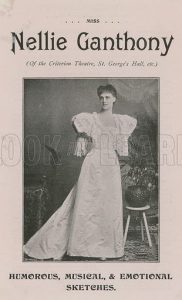
Nellie started off in a double act with her brother before branching out on her own with her songs and ‘humorous, musical, & emotional sketches’. She spent some time in North America in the mid 1890s, where she had a brief marriage to a wealthy barrister who was still married to someone else. On her return to England she married again, and continued her career until 1913, dying in 1952 at the age of 88.
Robert and Nellie’s brother Richard was a successful playwright, spending much of his time in the United States. His best known play was the 1899 comedy A Message from Mars, which was filmed three times in the silent movie era. His wife’s sister was the film star Marie Dressler.
So that was Robert Davy Ganthony, a man with some famous relations. A dentist, artist, cyclist, and, for a brief time, a Twickenham chessist.
Come back soon for another Minor Piece from Twickenham Chess Club.
